Electric and power engineering technical periodic press in Poland from the beginning until the year 1945
Electrical engineering began to separate from physics in the XIXth century called sometimes “the century of steam and electricity”. But no separate magazine dedicated to the problems of electricity originated on the Polish ground until the year 1919. It does not mean, of course, that there were not published articles or informations concerning the dynamically developing electrical engineering. They were appearing in Polish magazines of natural science and technical character, first of all on territories annexed by Russia and Austria. The first one was Izys Polska (Polish Izis), a magazine of technical, economic and agricultural character, published in Warsaw in the years 1820-1828. There also appeared magazines like Dziennik Politechniczny (Polytechnical Daily), Inżynieria i Budownictwo (Engineering and Building), and also Gazeta Przemysłowo-Rzemieślnicza (Industry and Handicraft Gazette) printed in the years 1884-1939.
Next in Lvov, a magazine Dźwignia (The Lever) founded in 1877 was appearing, converted after six years into Czasopismo Techniczne (Technical Magazin), the organ of Towarzystwo Politechniczne Lwowskie (Lvov Polytechnic Society) and then for some years of Krakowskie Towarzystwo Politechniczne (Cracov Polytechnic Society). There were many electricians, the later founders of Stowarzyszenie Elektryków Polskich (Association of Polish Electrical Engineers SEP), in editorial staff of this magazine. We can mention by names Mr Mr Maurycy Altenberg and Kazimierz Drewnowski, and among the authors of articles connected with electrical engineering there were also Roman Cieślewski, Tadeusz Gayczak, Zdzisław Szpor and many other eminent Polish electricians.
Starting from the year 1866, Przegląd Techniczny (Technical Review) began to appear and it exists until now. In its columns much place was dedicated to the problems of electrotechnics in articles of such pioneers of electrical engineering like Tomasz Arlitewicz, Alfons Kühn, Stanisław Odrowąż-Wysocki or Bernard Szapiro – the last mentioned one became an editor of the initiated in 1904 column Elektrotechnika (Electrical Engineering). It was from Przegląd Techniczny that the first independent magazine referring to electrical engineering problems Przegląd Elektrotechniczny (Electrical Engineering Review) emerged and began to appear in May of 1919.
In the interwar period, together with violent development of electrification of the country, there followed the flourishment of electrical and power engineering periodical press. From amongst many bulletins and monthly and weekly magazines we can mention Biuletyn InformacyjnyZwiązku Elektrowni Polskich (Informational Bulletin of Polish Electric Power Plants Association), Elektryczność w domu (Electricity at Home), Iformacje dla przyjaciół (Informations for our friends) edited by Fabryka Aparatów Elektrycznych K.Szpotański and Co., Kuchnia Elektryczna (Electric Kitchen), Światło i Siła (Light and Power) or Tramwajarz (Streetcar Driver).
Magazine “Technika Cieplna” (“Thermal Technology”) published in the years 1923-1939 was of particular importance for power engineering. It was a monthly dedicated to the problems of thermal economy and boiler inspection and, edited by eng. Jan Komarnicki, was an organ of Stowarzyszenie Dozoru Kotłów (Steam Boiler Inspection Association). It is worth saying that the Association was an organization called into being with the aim to look after the proper work of steam boilers, mainly from the operational safety point of view, but it also dealt with problems of thermal economy and in some cases supervised electric appliances – in particular, ordered by Wyższy Urząd Górniczy (State Mining Authority), it had to inspect electric appliances working in hard coal mines. This sort of activity concerned first of all the Katowice Association administered by one of the most eminent Polish electric and power engineers prof. Jan Obrąpalski, one of SEP Presidents and a precursor in theoretical and practical application of electric drives in mining and metallurgy industries.
A peculiar thing is a fact that the monthly Technika Cieplna was subsidized by all three Stowarzyszenie Dozoru Kotłów in Poland: in Warsaw, Katowice and Poznań, and thanks to it its circulation equalled 100 000 copies per month. It was delivered to all steam boiler users and workers of Stowarzyszenie Dozoru Kotłów throughout Poland.
Also in the interwar period increased an importance of SEP magazines. First of all it concerned Przegląd Elektrotechniczny, where in the years 1926-1939 appeared as a supplement Sprawozdania i Prace Polskiego Komitetu Energetycznego (Reports and Works of Polish Energy Committee), our domestic representative of Światowa Konferencja Energetyczna (World Energy Conference). There were published:
- comprehensive technical articles connected with the Committee activities concerning electrification and development of power industry in Poland
- protocols and reports referring to the works of each individual expert commission of the Committee
- shorthand reports on meetings and discussions over the key technical and economic problems concerning electrification of the country, in which were taking part the leading representatives of the state administration, state economy and the Polish science.
In 1933 SEP founded Wiadomości Elektrotechniczne (Electrical Engineering News), a magazine dedicated to practised electricians working first of all in industry and building trade, and also for designers and manufacturers of equipment, machines and electric appliances. Furthermore, during the interwar period, several dozen radio and teletechnical magazines were published.
During the Second World War and the occupation period the magazines ceased to exist. German and Soviet occupants exterminating Polish culture did not allow to publish technical magazines in Polish, either. Only a few of them were appearing in Great Britain and in Oflag Woldenberg – a German concentration camp for Polish oficers.
After the year 1945. Power engineering scientific-technical magazine Energetyka
After the initial period of attempts to come back to technical magazines issued by many various editors, technical press was finally centralized as the result of transforming Poland into a centrally managed totalitarian country. It was subordinated, from one side, to the newly created in 1945 Naczelna Organizacja Techniczna NOT (Main Technical Organization), and from the other – to Urząd Kontroli Prasy, Publikacji i Widowisk (Department for Press, Publications and Spectacles Control) i.e. a preventive censoring institution which additionally was the only disposer of printing paper, deciding of every single circulation of the magazine.
As the result of this “transformation”, there was only one – belonging to NOT – publishing firm left on the so-called publishing market, editing scientific and various workshop magazines in the form of bulletins.

“The Father” of power engineering magazines became Eng. Józef Michejda – a man having not only a very interesting curriculum vitae, but also a man of wide interests and fully aware of the role which technical magazines can play in the process of additional schooling and self-improvement of electric and power engineers busy with the large-scale developing of the Polish power industry. In his opinion such magazines could, in a relatively cheap and fast way, acquaint our engineers with contemporary foreign building and operating technologies as well as enable the experience exchange between the domestic creators of power technologies.
Józef Michejda was born in Wędrynia (Cieszyn Silesia) in the year 1900, in the Wędrynia line of Michejda family, the family of outstandingly talented persons who left their stamp on the history of Cieszyn Silesia and contributed a significant share to the Polish science and culture. His father was a country teacher and a social worker. Józef Michejda began his education in 1912 in a Cieszyn grammar school, interrupting it in the years 1918-1919 when he volunteered for the just forming Polish Army and participated in fightings with Czechs and Ukrainians for the borders of rebirthed Poland. From 1920 he was studying at the Faculty of Machine Technology and Electric Engineering at Gdańsk University of Technology. After finishing his studies in 1928, he began working for Polish branches of Siemens and Brown Bovery in, successively, Grudziądz, Poznań and Warsaw not only because of his competence but also his fluent knowledge of foreign languages: German, French and English. In the years 1931-1939 he lived in Silesia, where in 1932 he became the first Polish managing director of Elektrownia Chorzów (Chorzów Electric Power Plant) and then Śląskie Zakłady Elektryczne Ślązel (Silesian Power Plant Ślązel) in Chorzów and Katowice. During the Second World War, in its initial period, he was taking part in an underground movement Związek Walki Zbrojnej ZWZ (Union of Armed Struggle ZWZ) and after physical liquidation of the Silesian ZWZ Region by Gestapo he, despite arrest warrants issued against him, fled to Rzeszów area of Poland and there he was hiding as a cooperative worker.
Beginning from 1945 Józef Michejda held managerial posts in the newly organized Silesian power engineering. He was managing director of Zjednoczenie Energetyczne Zagłębia Węglowego ZEZW (Energy Union of the Silesian Coal Basin) and, after the next reorganization, of Zjednoczenie Energetyczne (Energy Union). Reconstruction of Silesian industry, its further development and efficient work enabling delivery of electric energy to our country under rebuilding, were in great part his personal merit.
Józef Michejda was a man appreciating the importance of technical press. As there was practically no competent technical literature at that time he, in September of 1947, called into being a Biuletyn Techniczny ZEZW (Technical Bulletin of ZEZW) which after a double change of the name became – two years later – Energetyka monthly.
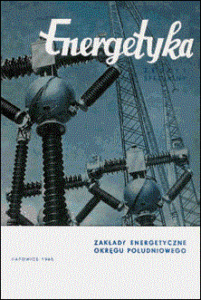
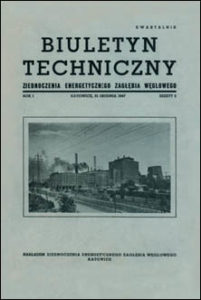
The first editorial team of the magazine in 1947 consisted of Mr Mr Józef Michejda and Bronisław Lis as the editor-in-chief. The first editorial board came into being in 1949 and consisted of the editor-in-chief and Mr Mr Tadeusz Frank, Stefan Krzycki, Józef Michejda, Sergiusz Minorski and Eugeniusz Zadrzyński.
For many years until the end of his life, Józef Michejda cooperated with the editorial staff. He also held responsible posts in Ministry of Power Engineering and was the director of Państwowa Inspekcja Energetyczna (National Power Inspectorate). Arrested in 1954 on a groundless charge of taking part in a plot having an aim to overturn the people’s leadership, he was imprisoned and kept in custody with no legal proceedings. At the end, in 1955, he was released from prison because of “no grounds to lodge an indictment”. As there was no possiblity for him to come back and work for the power industry any more, he dedicated the rest of his life for the work in Energetyka and in the founded by him in the year 1953 magazine Gospodarka Cieplna – Energetyka Przemysłowa (Thermal Economy – Industrial Power Engineering), the predecessor of Gospodarka Paliwami i Energią (Fuel and Energy Management).
He was an active member of SEP from the year 1935. Died in 1991 and was buried at the Evangelical-Augsburg cemetery in Warsaw.
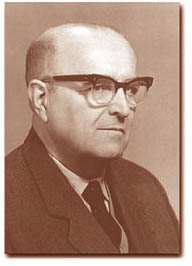 When in 1947 Józef Michejda called into being Biuletyn Techniczny Zjednoczenia Energetycznego Zagłębia Węglowego, the Bulletin’s first editor-in-chief became Bronisław Lis, Ma.E., electrician, a specialist in the field of electric energy and power utilization by industrial works and electric energy losses.
When in 1947 Józef Michejda called into being Biuletyn Techniczny Zjednoczenia Energetycznego Zagłębia Węglowego, the Bulletin’s first editor-in-chief became Bronisław Lis, Ma.E., electrician, a specialist in the field of electric energy and power utilization by industrial works and electric energy losses.
Bronisław Lis was born on the 17th October, 1899, in Łukawica (adm. district of Lesko) as the only son of Jan and Honorata born Dobrowolska. In the years 1919-1926 he was studying at the Electric Engineering Branch of Politechnika Lwowska Department of Mechanical Engineering. He began to work even before graduation in Akcyjne Towarzystwo Elektryczne in Lvov.
In the years 1927-1946 he worked for Miejskie Zakłady Elektryczne MZE (Municipal Electric Works) in Lvov. During the Second World War and German and Soviet occupation he was also working for MZE and after that, in the years 1945-1946, as the manager of Elektroinspekcja in Energozbyt of the Lvov Energokombinat.
In June 1946 he left Lvov with one of the repatriation transports and came to Upper Silesia becoming a resident first of Tarnowskie Góry and then of Bytom, where he lived until his death. On the 29th August of 1946 he began working for Zjednoczenie Energetyczne Zagłębia Węglowego (ZEZW) where he was a respected worker until reaching pensionable age. He was engaged in problems concerning utilization of electric energy, its limitation, and also the practice and theory of electric energy losses.
As it was mentioned before, in September 1947 he became the editor-in-chief of Biuletyn Techniczny ZEZW, which was two years later converted into Energetyka monthly, and held this post until 1975. He devoted much work and efforts, sparing no time for development of the magazine. He was taking much care for purity of Polish language in published articles and on that score Energetyka took one of the first places among many respectable magazines issued for electric power industry e.g. publications of Komitet Elektryfikacji Polski PAN (Committee for Electrification of Poland). As Energetyka’s editor-in-chief he made many efforts to be sure that the magazine would meet requirements of electric power professionals and would contain articles dedicated to actual and the most burning problems of this engineering branch.
Apart from articles in Energetyka he published several books referring to rational utilization of electric energy, dedicated to the wide group of engineers and technicians. The books, written in comprehensible and clear manner and on top of that in beautiful Polish language, were very popular and were re-edited for many times. They were: Straty energii w sieciach elektrycznych (“Energy losses in electric networks”) (1950), Liczniki energii elektrycznej (“Electric energy meters” (1953, 1962 and 1967), Wskaźniki elektroenergetyczne zakładów przemysłowych (“Energy indicators of industrial plants”) (1954), Gospodarka energią elektryczną w zakładach przemysłowych (“Electric energy management in industrial plants”) (1955, 1963) and others.
He was an active member of Lvov’s branch of SEP which he joined in 1926. In the years 1928-1934 he was its secretary, and in 1947 he became the secretary of the Zagłębie Węglowe Branch in Katowice. He was also a member of Rada Czasopism Elektrycznych (Electric Magazines Editorial Board) of SEP.
Died on 3rd September of 1975 and was buried at Rakowicki Cemetery in Cracov.
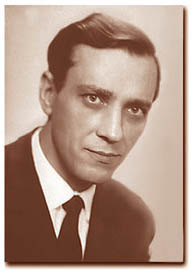 After the death of Bronisław Lis, the editor-in-chief of Energetyka became Mr Zdzisław Olszewski, Ma.E., an eminent specialist in the field of electric machines operation and overhauls.
After the death of Bronisław Lis, the editor-in-chief of Energetyka became Mr Zdzisław Olszewski, Ma.E., an eminent specialist in the field of electric machines operation and overhauls.
Born on 22nd October 1927 in Nowa Wilejka, he was the son of Stanisław and Michalina born Rodziewicz. He graduated from primary school in Vilnius in the year 1939. From 1939 until 1941 he was attending the Adam Mickiewicz grammar school in Vilnius and then, in the years 1943-1944, he was working as a navvy in Nowa Wilejka hospital (Neu Wilna Ostland Lazarett). In 1944 he volunteered for the Polish First Army and served on the front line as a radiotelegraphist. He left the Army in 1946 after the order concerning demobilization of child soldiers was announced and settled in Sulęcin, small town in Ziemia Lubuska, where he was joined in 1947 by his father, a soldier of the Polish Armed Forces in the West.
Zdzisław Olszewski graduated summa cum laude from Silesian University of Technology Electric Department and in 1954 was granted a diploma of the Master of Electric Engineering. He started working for Zakłady Energetyczne Okręgu Południowego (Southern Region Energy Company) in Katowice and from then on was associated with utility power industry specializing in problems of electric machines operation and overhauls. He was a respected specialist in this field and contributed not only to improvement of operation and availability factors of generators but also to implementation of preventive maintenance and proper diagnosing of their condition. He belonged to the main initiators and authors of the program concerning development of the repair back-up facilities assigned to serve the whole commercial power industry and located in Lubliniec (today’s Energoserwis SA). He was also the author of a book dedicated to the problems of generator operation and published many specialized articles, very important for practice engineers.
It was technical journalism that he loved the most and dedicated much time of his professional occupation and private life. Delegated by the then area director to cooperation with the editorial office of Energetyka he became the subeditor to editor-in-chief Mr Bronisław Lis, and after his death in September of 1975, the editor-in-chief himself.
Infatuated in his not easy editorial work, he was deeply convinced that an exchange of thoughts and experience between power engineers and technicians was of a great importance for Polish power engineering. He was at the same time a lover, expert and a protector of Polish language purity, guarding its beauty in such a difficult sphere like engineering. Zdzisław Olszewski managed to gather a large group of active persons and co-workers around Energetyka – also numerous authors belonging to the post-war group of power engineers. He was in his element when working as the editor and he “infected” the group of young editors and editresses with his enthusiasm, patience and belief in social serviceableness. They proved themselves editing Energetyka after he left his post as a result of being implicated in a completely unnecessary conflict between the then SEP authorities, Ministry of Mining and Energetyka.
As a man he was characterized by uprightness, rarely met honesty and diligence, great knowledge and eagerness in broadening his circle of interests and resources of possessed information, and also by great personal culture though from time to time it was accompanied by a full of nervousness inteligent malice.
He was an active member of SEP. Died on 30th July of 2000 in Katowice and there he was buried.
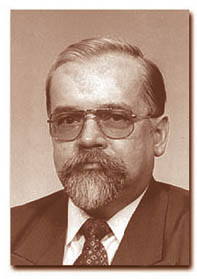 The duties of editor-in-chief, after Zdzisław Olszewski’s leave, were taken over by Wojciech Błoński, Ma.E. Born on 13th April of 1949 in Sosnowiec as the first son of Maria and Tadeusz Błoński, he was an alumnus of the well known Stanisław Staszic secondary school in that town in 1967. He was always very proud that he belonged to “Staszicaki” (group of alumni of the Stanisław Staszic secondary school) and often emphasized the fact that such eminent Poles like Jan Kiepura or Bogdan Suchodolski also completed their secondary education in that, being more than one hundred years old, school. He graduated from Silesian University of Technology at the Faculty of Electric Engineering, becoming a master electrical engineer. His fondness of the humanities which he also received at school, was revealed when during the last years of his studies he was co-operating with magazines Politechnik and Student.
The duties of editor-in-chief, after Zdzisław Olszewski’s leave, were taken over by Wojciech Błoński, Ma.E. Born on 13th April of 1949 in Sosnowiec as the first son of Maria and Tadeusz Błoński, he was an alumnus of the well known Stanisław Staszic secondary school in that town in 1967. He was always very proud that he belonged to “Staszicaki” (group of alumni of the Stanisław Staszic secondary school) and often emphasized the fact that such eminent Poles like Jan Kiepura or Bogdan Suchodolski also completed their secondary education in that, being more than one hundred years old, school. He graduated from Silesian University of Technology at the Faculty of Electric Engineering, becoming a master electrical engineer. His fondness of the humanities which he also received at school, was revealed when during the last years of his studies he was co-operating with magazines Politechnik and Student.
These journalistic interests and also the leftist opinions resulted in his engagement as a journalist in Katowice daily Trybuna Robotnicza, specializing in technical and economical problems referring to development of the south macroregion of Poland.
From 1976 he bound up his fate for good with Energetyka monthly, becoming its subeditor – the editor-in-chief was then Mr Zdzisław Olszewski. Wojciech Błoński was also the manager of Katowice branch of Przegląd Techniczny (“Technical Review”), the all-Polish weekly of a very wide circle of readers. For more than ten years he was publishing there articles concerning vital problems of Silesian region. During the Martial Law period, after the ban for publishing the magazine was lifted and many perturbations ended with the recall of Mr Zdzisław Olszewski, Wojciech Błoński was appointed in 1983, by the then President of SEP Mr Jacek Szpotański, to the post of Energetyka editor-in-chief. He performed the duty for seventeen years until his untimely death.
The unchallenged merit of Wojciech Błoński was that he could consolidate the editorial staff in difficult moments and continue publishing of the magazine, loosing nothing of the achievements of his predecessors. Moreover, taking care of keeping Energetyka on a high professional level, he did not neglect the economic aspects, either. It is worth saying that for all the time the magazine was a profitable venture independently of the fact whether the publisher was Wydawnictwo Czasopism i Książek Technicznych NOT (NOT Publishing House of Technical Magazines and Books) or Wydawnictwo NOT SIGMA (NOT SIGMA Publishers).
After the beginning of economic transformation in Poland, Energetyka was the first and only magazine at that time that left the publishing firm SIGMA and became a publication of Zarząd Główny SEP (SEP Main Board). It was only thanks to the editor-in-chief, his efforts and forethought as well as the skill to efficiently supervise the work of a small editorial staff, that the share of Energetyka in creating SEP’s budget was significant.
Wojciech Błoński died suddenly, being not even 51 years old, on 28th January, 2000 and was buried at Sosnowiec cemetery.
After the leave of Wojciech Błoński, a new editor-in-chief was appointed on the 1st of March, 2000 to this post by the President of SEP, prof. Stanisław Bolkowski. It was Tomasz E.Kołakowski, Ma.E., a specialist in electric power systems, connected with Południowy Okręg Energetyczny (South Power Industry Region) and PSE SA (Polish Power Grid Co.), and for many years – from 1975 – a supernumerary member of the editorial staff of Energetyka, for several years performing duties of a subeditor.
The secretaries of Energetyka editorial board were successively: Gerard Gola (1952-1981), Eng. Zbigniew Jan Gurgul 1981-1990) and from 1991 Ms Iwona Gajda, M.A., being also the subeditor from 2005.
